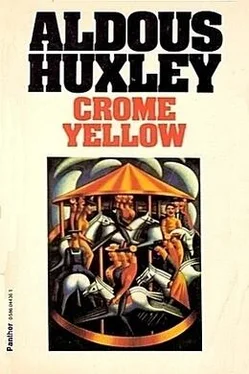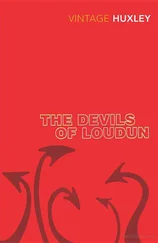"I entirely disagree with you," said Mary. "Sex isn't a laughing matter; it's serious."
"Perhaps," answered Mr. Scogan, "perhaps I'm an obscene old man. For I must confess that I cannot always regard it as wholly serious."
"But I tell you…" began Mary furiously. Her face had flushed with excitement. Her cheeks were the cheeks of a great ripe peach.
"Indeed," Mr. Scogan continued, "it seems to me one of few permanently and everlastingly amusing subjects that exist. Amour is the one human activity of any importance in which laughter and pleasure preponderate, if ever so slightly, over misery and pain."
"I entirely disagree," said Mary. There was a silence.
Anne looked at her watch. "Nearly a quarter to eight," she said. "I wonder when Ivor will turn up." She got up from her deck–chair and, leaning her elbows on the balustrade of the terrace, looked out over the valley and towards the farther hills. Under the level evening light the architecture of the land revealed itself. The deep shadows, the bright contrasting lights gave the hills a new solidity. Irregularities of the surface, unsuspected before, were picked out with light and shade. The grass, the corn, the foliage of trees were stippled with intricate shadows. The surface of things had taken on a marvellous enrichment.
"Look!" said Anne suddenly, and pointed. On the opposite side of the valley, at the crest of the ridge, a cloud of dust flushed by the sunlight to rosy gold was moving rapidly along the sky–line. "It's Ivor. One can tell by the speed."
The dust cloud descended into the valley and was lost. A horn with the voice of a sea–lion made itself heard, approaching. A minute later Ivor came leaping round the corner of the house. His hair waved in the wind of his own speed; he laughed as he saw them.
"Anne, darling," he cried, and embraced her, embraced Mary, very nearly embraced Mr. Scogan. "Well, here I am. I've come with incredulous speed." Ivor's vocabulary was rich, but a little erratic. "I'm not late for dinner, am I?" He hoisted himself up on to the balustrade, and sat there, kicking his heels. With one arm he embraced a large stone flower–pot, leaning his head sideways against its hard and lichenous flanks in an attitude of trustful affection. He had brown, wavy hair, and his eyes were of a very brilliant, pale, improbable blue. His head was narrow, his face thin and rather long, his nose aquiline. In old age—though it was difficult to imagine Ivor old—he might grow to have an Iron Ducal grimness. But now, at twenty–six, it was not the structure of his face that impressed one; it was its expression. That was charming and vivacious, and his smile was an irradiation. He was forever moving, restlessly and rapidly, but with an engaging gracefulness. His frail and slender body seemed to be fed by a spring of inexhaustible energy.
"No, you're not late."
"You're in time to answer a question," said Mr. Scogan. "We were arguing whether Amour were a serious matter or no. What do you think? Is it serious?"
"Serious?" echoed Ivor. "Most certainly."
"I told you so," cried Mary triumphantly.
"But in what sense serious?" Mr. Scogan asked.
"I mean as an occupation. One can go on with it without ever getting bored."
"I see," said Mr. Scogan. "Perfectly."
"One can occupy oneself with it," Ivor continued, "always and everywhere. Women are always wonderfully the same. Shapes vary a little, that's all. In Spain"—with his free hand he described a series of ample curves—"one can't pass them on the stairs. In England"—he put the tip of his forefinger against the tip of his thumb and, lowering his hand, drew out this circle into an imaginary cylinder—"In England they're tubular. But their sentiments are always the same. At least, I've always found it so."
"I'm delighted to hear it," said Mr. Scogan.
The ladies had left the room and the port was circulating. Mr. Scogan filled his glass, passed on the decanter, and, leaning back in his chair, looked about him for a moment in silence. The conversation rippled idly round him, but he disregarded it; he was smiling at some private joke. Gombauld noticed his smile.
"What's amusing you?" he asked.
"I was just looking at you all, sitting round this table," said Mr. Scogan.
"Are we as comic as all that?"
"Not at all," Mr. Scogan answered politely. "I was merely amused by my own speculations."
"And what were they?"
"The idlest, the most academic of speculations. I was looking at you one by one and trying to imagine which of the first six Caesars you would each resemble, if you were given the opportunity of behaving like a Caesar. The Caesars are one of my touchstones," Mr. Scogan explained. "They are characters functioning, so to speak, in the void. They are human beings developed to their logical conclusions. Hence their unequalled value as a touchstone, a standard. When I meet someone for the first time, I ask myself this question: Given the Caesarean environment, which of the Caesars would this person resemble—Julius, Augustus, Tiberius, Caligula, Claudius, Nero? I take each trait of character, each mental and emotional bias, each little oddity, and magnify them a thousand times. The resulting image gives me his Caesarean formula."
"And which of the Caesars do you resemble?" asked Gombauld.
"I am potentially all of them," Mr. Scogan replied, "all—with the possible exception of Claudius, who was much too stupid to be a development of anything in my character. The seeds of Julius's courage and compelling energy, of Augustus's prudence, of the libidinousness and cruelty of Tiberius, of Caligula's folly, of Nero's artistic genius and enormous vanity, are all within me. Given the opportunities, I might have been something fabulous. But circumstances were against me. I was born and brought up in a country rectory; I passed my youth doing a great deal of utterly senseless hard work for a very little money. The result is that now, in middle age, I am the poor thing that I am. But perhaps it is as well. Perhaps, too, it's as well that Denis hasn't been permitted to flower into a little Nero, and that Ivor remains only potentially a Caligula. Yes, it's better so, no doubt. But it would have been more amusing, as a spectacle, if they had had the chance to develop, untrammelled, the full horror of their potentialities. It would have been pleasant and interesting to watch their tics and foibles and little vices swelling and burgeoning and blossoming into enormous and fantastic flowers of cruelty and pride and lewdness and avarice. The Caesarean environment makes the Caesar, as the special food and the queenly cell make the queen bee. We differ from the bees in so far that, given the proper food, they can be sure of making a queen every time. With us there is no such certainty; out of every ten men placed in the Caesarean environment one will be temperamentally good, or intelligent, or great. The rest will blossom into Caesars; he will not. Seventy and eighty years ago simple–minded people, reading of the exploits of the Bourbons in South Italy, cried out in amazement: To think that such things should be happening in the nineteenth century! And a few years since we too were astonished to find that in our still more astonishing twentieth century, unhappy blackamoors on the Congo and the Amazon were being treated as English serfs were treated in the time of Stephen. To–day we are no longer surprised at these things. The Black and Tans harry Ireland, the Poles maltreat the Silesians, the bold Fascisti slaughter their poorer countrymen: we take it all for granted. Since the war we wonder at nothing. We have created a Caesarean environment and a host of little Caesars has sprung up. What could be more natural?"
Mr. Scogan drank off what was left of his port and refilled the glass.
Читать дальше











